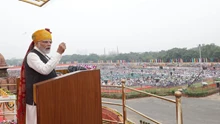
In accordance with the legislation enacted after its passing by the Parliament (e.g. Sec 2 (d) of The Farmers’ Produce TCFC Act 2020) Fish Farmers Producer Organization (FFPO) is a generic name, which means an association or group of fishers or fish farmers or of fisheries stakeholders, with the primary objective of carrying out sustainable fisheries value chain business by whatever name called, (i) registered under any law for the time being in force; or (ii) promoted under a scheme or programme supported by the Central or State Government.
Pradhan Mantri Matsya Sampada Yojana (PMMSY) is the scheme for sustainable and responsible development of fisheries sector at an investment of Rs. 20050 Crore.FFPOs can be registered under either Cooperative Societies Act / Companies Act. National cooperative development corporation is an implementing agency for this scheme, under which 500 FFPOs will be formed initially. It can be registered under Cooperative Societies Act of the State OR Under Companies Act.
Objectives of developing Fish Farmer Producer Organisations:
-
Economically empower the fishers and fish farmers and enhance their bargaining power by achieving economies of scale.
-
Enhance productivity through efficient, cost-effective and sustainable resource use.
-
Realize higher returns for fishers and fish farmers through better liquidity and remunerative market linkages for their produce.
-
Build capacities of fishers and fish farmers to develop entrepreneurial skills for making the FFPOs economically viable and self-sustaining.
-
Develop vibrant and sustainable income-oriented fisheries value chains.
Broad Services to be undertaken by FFPOs
Production and Productivity:
-
Supply of quality inputs like seed, fingerlings, brood stock, fish feed, fishing nets
-
and such other inputs for production at reasonable rates.
-
Undertake Pond Culture, Pen Culture, Cage culture, RAS, Raceways, Bio-floc
-
related fish culture activities for both inland and marine regions.
-
Dissemination of Technology, Quality control and other fisheries related
-
activities and innovations.
-
Undertake aggregation of smaller lots of farmer-members produce.
Post-Harvest Management and Infrastructure:
-
Make available need-based production and post-production machinery and
-
equipment like storage – Ice flakes, ice boxes, and transportation/logistic
-
support – reefer vans, insulated cargo and such other machinery and
-
equipment on custom hiring basis for members to reduce the per unit
-
production cost.
-
Make available services offering value addition like cleaning, assaying. sorting,
-
grading, packing and also fish farm level processing facilities at user charge
-
basis at a reasonably cheaper rate.
-
Undertake high value addition / processing units for better price realization and
-
Traceability related interventions can also be proposed by FFPOs.
-
Undertake higher income generating activities like cold chain development,
-
seed/brood stock production, ornamental fisheries, seaweed cultivation, cold
-
water fisheries, fish kiosks, aquarium manufacturing etc.
-
Undertake any activity (including but not limited to microfinance, e-market,
-
technical support, repairs and maintenance services for boats, motors, cold
-
chain, reefer transport etc.) associated with fisheries supply chain as door-step
-
support
Marketing and Branding:
-
Branding, packaging, leveling, standardization of products.
-
Market the aggregated produce with better negotiation strength in marketing
-
channels offering better and remunerative prices.
-
Facilitate market information about the produce for educated decision-making
-
in production and marketing. FFPOs may also undertake operation of fish
-
vending kiosks at various urban centers.
-
Development of fish and fisheries related products / by-products and tie ups for
-
domestic and export sales
Composition of FFPO:
The FFPOs may comprise of,
-
Fishers
-
Fish Farmers
-
Fish Workers and Fish Vendors
-
Fisheries entrepreneurs
-
Or any other person(s) associated with fisheries sector as decided by Dept of Fisheries, Government of India.
Implementing Agencies (IA)
(i) State/UT Fisheries Departments and their entities
(ii) National Fisheries Development Board (NFDB)
(iii) Small Farmers Agriculture Consortium (SFAC)
(iv) National Cooperatives Development Corporation (NCDC)
(v) National Bank for Agriculture and Rural Development (NABARD)
Main role of Implementing Agency
-
IA works with Community Based Business Organizations (CBBOs) to make FFPOs economically sustainable.
-
Monitor and supervise the functioning of CBBOs.
-
Formulation of rating tools for FFPOs
Cluster based business organizations (CBBO)
-
CBBOs are empaneled by IA.
-
In a State, based on geography, fisheries clusters etc., there may be one or more than one CBBO. One CBBO may serve more than one State/UT as per requirement.
-
CBBOs given work as per human resources available with them, past turnover and work experience etc.
-
CBBOs should have experience in formation of FFPOs in fisheries and allied sector and should provide handholding support to FFPOs.
-
CBBOs must have five specialists– Fisheries Business Operations, Fisheries PostHarvest Management, Social Mobilization, Law & Accounts and Fisheries/ AgriMarketing with IT/MIS skills.
Duties and responsibilities of CBBOS
-
Assist in implementation of scheme
-
Assist IA in cluster identification.
-
Assist in community mobilization – baseline survey, cluster finalization, value chain study, formation of groups and FFPOs and their periodic meetings.
-
Registration of FFPO
-
Training of Board of Directors (BOD) on roles, responsibilities, management and also capital/equity mobilization.
-
Training and capacity building of FFPOs – Training needs identification, develop training modules; conduct basic training workshop; exposure visits, on-line training, webinars etc.
-
Encourage and promote social cohesiveness amongst members of FFPOs.
Strategy for FFPOS formation
-
Based on Fisheries Business Cluster Area, defined as - for the purpose of FFPO formation, promotion, operations and management means a geographical area wherein a fisheries related business can be formed for leveraging economies of scale in the entire fisheries value chain in a sustainable manner.
-
Fisheries Business Cluster Area to be identified by CBBO, with IA’s approval.
-
CBBOs will undertake feasibility studies - two components. i. Diagnostic study including baseline survey ii. Business plan
-
FFPOs can be federated at District and State levels
-
Existing FFPOs (including fisheries primary cooperatives) may avail relevant benefits including advisory services from CBBO and IA.
-
FFPOs, to be supported through technical and managerial training for their BoDs and CEOs to implement business plan.
-
FFPOs including fisheries primary cooperatives which are already registered but have not yet started business operation also covered.
Payment criteria for CBBOs
Six months from beginning
-
Number of FFPOs formed
-
Aggregation activities
Six months to one year
-
Institutional Training to CEO/BODs
-
Number of FFPOs formed
-
Members –Min 100 members in plain areas and 35 in hilly/ NER.
-
Registration FFPOs & Formulation of Business Plan
Second Year
-
1 st equity grant availed by the FFPO
-
Statutory clearance to carry out business
-
Minimum 50% of business activities as per business plan
-
Number of awareness program for FFPOs
-
1 st tranche of equity grant and credit guarantee availed by FFPOs
Third year
-
Issue of share certificate to each member
-
Members – 300 members in Plain areas and 100 in Hilly/NE Regions.
-
Audited Financial Statements of FFPOs
-
2nd tranche of equity grant and credit guarantee availed by FFPOs
Final year
-
Utilization Certificates
-
100% of business plan executed and value chain developed
-
Revenue model showing financial stability in last 3 consecutive years
-
Detailed Project Completion Report
-
3rd tranche of credit guarantee facility
Minimum qualification of office bearers of FFPOs
-
CEO / Manager should be graduate in Fisheries / AgriBusiness Management or BBA or equivalent.
-
Accountant with educational qualification of 10+2 with Mathematics as a compulsory subject or alternatively with Commerce or Accountancy background.
-
Member of FFPOs can be considered if they meet the criteria.
Government support
Provision for Equity Grant scheme:
The objectives of Equity Grant are to (i) enhance viability and sustainability of FFPOs; (ii) increase credit worthiness of FFPOs; and (iii) enhance shareholding of members to increase their ownership and participation in their FFPO.
Equity Grant will be in the form of matching grant up to Rs. 2,000/ per producer member subject to a limit of Rs. 15 lakh per FFPO. This Equity Grant is not in the form of government participation in equity, but only as a matching grant to the FFPOs as members’ equity.
The Department of Fisheries, Ministry of Fisheries, Animal Husbandry and Dairying through Small Farmers Agri-Business Consortium of Ministry of Agriculture and Farmers Welfare (MoAFW), Government of India assisted setting up of 5 FFPOs in the states of Bihar, Himachal Pradesh, Andhra Pradesh and Uttar Pradesh on pilot basis under the erstwhile Centrally Sponsored Scheme Blue Revolution-Integrated Development and Management of Fisheries and these 5 FFPOs have already been registered. Further, under PMMSY, the Department of Fisheries, Ministry of Fisheries, Animal Husbandry and Dairying during 2020-21 has accorded approval to the proposal of National Cooperative Development Corporation, MoAFW for setting up of 50 FFPOs at a total cost of Rs.24.50 crore. Besides, approval has also been accorded during 2020-21 to the proposal of National Fisheries Development Board (NFDB) for setting up of 22 FFPOs at total cost of Rs. 10 crore under the PMMSY.
Funding
Formation and promotion of FFPOs will be taken up under the Central Sector Scheme component of PMMSY with 100% central funding.
As per Union Budget 2020, the Department of Fisheries, Government of India will set up 500 Fish Farmers Producer Organisations. While formation and promotion of 300 FFPOs/Cs will be supported under PMMSY, efforts will be made to support the remaining 200 FFPOs/Cs through convergence with the 10,000 FPO scheme of Department of Agriculture,Cooperation and Farmers Welfare (DoACFW), Ministry of Agriculture and Farmers Welfare (MoAFW), wherever possible.
The FFPO funding is broadly outlined across three heads and is tabulated below in Table 1:
Table 1: FFPO Financial Support
|
S. No. |
Particular |
Funds(upper limit) |
|
1 |
FPO Formation and Incubation Cost |
Rs. 25 Lakh / FFPO |
|
2 |
FPO Management Cost(up to 3 years) |
Rs. 18 Lakh / FFPO |
|
3 |
Equity Grant Provision |
Rs. 15 Lakh / FFPO* |
The Equity Grant Provision will be in the form of matching grant up to Rs 2000/- per member of FFPO subject to a maximum limit of Rs 15 lakhs per FFPO on the lines of 10,000 FPO scheme of Department of Agriculture, Cooperation and Farmers Welfare, Ministry of Agriculture and Farmers Welfare.
Training and capacity building of FFPOs
-
Laxmanrao Inamdar National Academy for Cooperative Research & Development (LINAC), Gurugram and its Regional Training Centres (RTCs) across the country under NCDC is designated as a Nodal Training Institution at central level.
-
NFDB will be overall Nodal Agency for coordination at national level for capacity building, training and skill development of FFPOs.
-
Nodal Training Institution may work in coordination with other reputed training organizations like NIRD, MANAGE, Agriculture / Fisheries Universities, ICAR Institutions, KVKs etc for extending training to FFPO stakeholder.
Monitoring
In addition to monitoring and supervision by Implementing Agencies of the FFPOs sub-component, the Project Monitoring Unit (PMU) of PMMSY in NFDB, the State Level Approval and Monitoring Committee (SLAMC) of PMMSY and the District Level Committee (DLC) of PMMSY will undertake periodic review, monitoring and supervision of the implementation of the FFPO sub-component under PMMSY at the National, State and District levels respectively.
Evaluation
Mid-term and end-term evaluation of the performance of the FFPO sub-component 25 under PMMSY will be carried out through a third party either as a part of the overall evaluation of the PMMSY scheme or as a standalone sub-component by the Department of Fisheries, Government of India.
REFERENCES
https://nfdb.gov.in/PDF/FFPO%20Guidelines.pdf
https://pib.gov.in/PressReleasePage.aspx?PRID=1739463
https://www.ncdc.in/documents/notice-circular/3218280721FFPOs-Guidelines.pdf
https://fisheries.karnataka.gov.in/info-2/Karnataka+Fish+Farmer+Producers+Organizations/en
Authors
Maulika J. Patel1, Ph.D. Scholar, Department of Extension Education, N.M.C.A., NAU, Navsari- 396 450, Email ID: maulipatel8140117127@gmail.com, Contact No.: 6355215698
Dr. Keyur V. Gardhariya2, Ph.D. (Agril. Extension), Research Associate, EEI, Anand
Email.ID: keyur.gardhariya.007@gmail.com , Contact No.: 9033584688












Share your comments